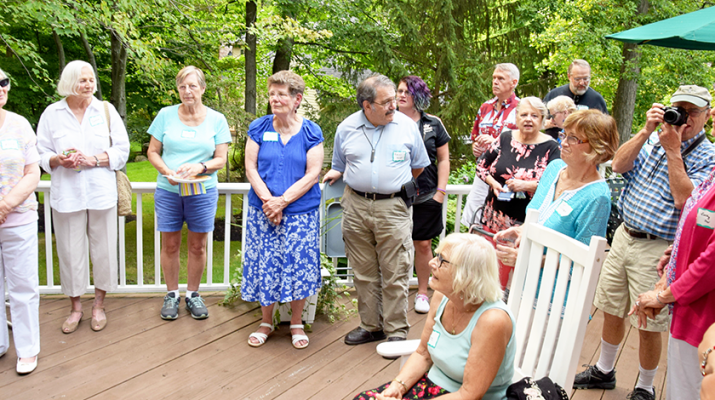The local chapter of Hearing Loss Association of America is in its 35th year of connecting those with hearing loss to resources — and each other
By Colleen M. Farrell
On a recent rainy Tuesday morning, about a dozen people gathered inside a Rochester church to talk.
The topics? Picking the right audiologist. How to have a conversation amid a lot of background noise. Ensuring a hearing aid’s proper fit. Remembering to wear said hearing aid.
“Not wearing hearing aids and going into a noisy situation is like training for a marathon by laying in bed,” audiologist Joe Kozelsky told the group.
With a little humor and a lot of camaraderie and understanding, tips and tactics for managing hearing loss were exchanged as part of HOPE, or Hearing Other People’s Experiences.
It is an outreach of the Hearing Loss Association of America’s Rochester chapter. The local HLAA was founded in 1983 by nine individuals. The next year, that group became an official member of Self Help for Hard of Hearing People, or SHHH, which is today known as the Hearing Loss Association of America.
As the Rochester chapters turns 35 years, it can now count more than 200 members. It has become one of the most active chapters in the country.
Losing the ability to hear can be an isolating and scary experience. Missing out on conversation. Not being able to enjoy entertainment like movies and live performances. Feeling less safe because you can’t hear noises around you.
Adapting to the changes hearing loss brings can be confusing, too.
“We understand, and so we share, because we know how difficult it is,” said Margaret Cochran, a member of HLAA Rochester’s board of directors.
The chapter offers a couple of different resources in addition to HOPE. Day and evening programs are held on the first Tuesday of each month from September to June. Guest speakers share knowledge and information on a variety of topics. An induction hearing loop and live captioning are used at every meeting. All programs, unless otherwise noted, are held at St. Paul’s Episcopal Church at 25 Westminster Road in Rochester.
The group has information that is useful to people at every stage, according to Cochran. She started suffering from hearing loss around 2000 as a result of Meniere’s disease, an inner ear disorder. She came to HLAA Rochester at the suggestion of a friend. Though she’s been a part of it for nearly two decades, Cochran said she still learns something new. She encouraged the attendees to look at the literature on display.
“If you don’t see what you need, ask for it, because chances are, someone will be able to help you in some way,” she said.
Marjorie Buck of Chili has attended HOPE twice. A hearing aid wearer since 1998, she said she has picked up useful information by attending the sessions.
“We especially enjoyed this part of it,” she said.
The chapter also puts out a newsletter from September to June. It includes information on events, chapter news, listings of local captioned theater productions, helpful tips and more. It can be found online at www.hearinglossrochester.org or received via mail for a nominal fee.
Another resource is the assistive listening device demo center at Lifespan, 1900 S. Clinton Ave. It is open from 10 a.m. to 2 p.m. on the third Thursday of each month (except for July and August). Visitors can learn about the latest in assistive listening devices from volunteers.
In addition, the organization has awarded over $100,000 in scholarship funds to more than 120 hard-of-hearing students headed off to college.
Next year, HLAA will hold its national convention in Rochester from June 20-23. Author, psychotherapist, disability rights advocate and extreme athlete Rebecca Alexander will be the keynote speaker.
Cochran encourages anyone dealing with hearing loss to get involved with HLAA.
“It’s a very personal experience and it’s different for everyone, but it’s comforting to know you are not alone,” she said.

